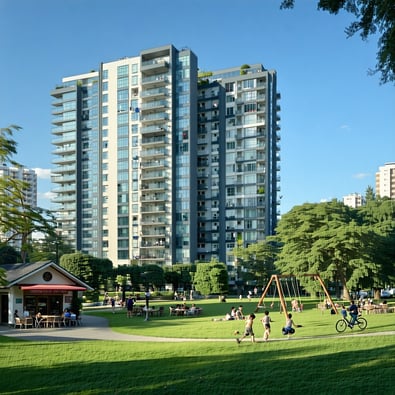In recent years, real estate investment has gained attention as a means of securing stable future income and building assets, with an increasing number of beginners entering the field. Against the backdrop of low interest rates and concerns about pensions, many people are likely thinking, “If I can generate a sustainable side income...” However, real estate investment is by no means an easy path. There are numerous cases where beginners fail due to a lack of knowledge and inadequate preparation.
According to a survey by a real estate information website, approximately 40.7% of respondents have experienced failure in real estate investment. When looking at the main causes of failure, “unfilled vacancies” (approximately 36%) and “unexpected expenses such as repairs and maintenance” (approximately 31%) top the list, followed by “buying at a high price” (approximately 30%) and “purchasing a property in a low-demand location” (approximately 16%). In other words, many beginners stumble over risks such as vacancies, cost management, and property selection.
Once you fail in real estate investment, you may end up with monthly cash flow in the red, having to cover the deficit from your own pocket, or stuck with a property that no one wants to buy, burdened by management costs—a situation that can be irreversible. To avoid such risks, it is crucial to understand typical failure patterns in advance and take preventive measures. In this article, we will explain common mistakes made by beginners in real estate investment and six important points to know in order to prevent them. By learning with honesty and a long-term perspective, you can take a safe first step toward sustainable growth.
Common mistakes
There are several patterns of mistakes commonly made by beginners in real estate investment. Below are some representative examples.
- Poor cash flow due to overly optimistic financial planning: Taking out a loan based solely on optimistic rental income projections, only to end up with monthly deficits due to vacancies or unexpected expenses. For example, assuming that there will be no vacancy periods or maintenance costs in the near future, only to find that vacancies or maintenance costs require additional out-of-pocket expenses.
- Lack of consideration for location leading to vacancy risks: Purchasing properties in low-demand areas or far from stations due to high surface yields, resulting in prolonged vacancies. Extreme cases have been reported where properties with extremely high yields (e.g., 60%) remained vacant despite the high figures, with no tenants ever materializing.
- Misunderstanding of sublease contracts: Buying sublease properties with the assumption that “rent is guaranteed, so it's safe,” only to be notified after signing the contract of reductions or termination of guaranteed rent. While subleases may seem appealing to beginners as a way to avoid vacancy risks and reduce hassle, failing to understand the risks outlined below can lead to significant losses.
- Taking real estate companies at their word: Purchasing a property after being persuaded by agents with claims like “This is a once-in-a-lifetime opportunity,” only to later discover risks that were not disclosed. Failing to thoroughly investigate the property's flaws or future risks before signing the contract can lead to unexpected expenses. In fact, real estate companies may only provide favorable information to maximize their commissions, so it is crucial to question, “Why is such a good property on the market?” and maintaining a calm, rational judgment is crucial.
- Unclear investment objectives or strategies: Even if you initially set a goal like “to use it as retirement income,” you may end up purchasing a property that doesn't align with your original plan due to short-term gains or sales pitches. Investing without a clear strategy can lead to aimless decisions, potentially resulting in the sale of the property without achieving the desired outcomes.
Such failures are by no means rare, and anyone, especially beginners, can fall into these traps. However, on the flip side, by understanding these typical failure factors in advance and taking preventive measures, you can significantly reduce the likelihood of failure. In the next chapter, we will explain in detail the six key points beginners should keep in mind to prevent these failures.
Six Key Points for Beginners to Avoid Failure
Create a detailed cash flow plan and prepare for risks
In real estate investment, a lax cash flow plan (cash flow calculation) can be fatal. It is essential to accurately calculate the amount remaining after deducting loan repayments, management fees, taxes, and other expenses from monthly rental income. In addition to the property price, various expenses such as registration fees, brokerage fees, and insurance premiums will arise. Furthermore, if vacancies or rental arrears occur, income will drop to zero, and the risk of having to cover the entire loan repayment amount out of pocket must also be considered.
For example, if you purchase a property expecting monthly rental income of 65,000 yen, but it remains vacant for seven months before finding a new tenant, the actual annual return rate would drop from the initially planned 7.8% to 2.6%, forcing you to cover the shortfall from your salary. Conduct such worst-case scenario simulations and prepare a plan that accounts for factors like vacancy periods, repair costs, and interest rate hikes. It is important to create a cash flow simulation with a margin of error rather than a plan that leaves you with just enough to get by. On top of that, always keep a reserve fund equivalent to several months' worth of loan repayments and expenses on hand to ensure you have a financial foundation that can withstand unforeseen circumstances.
Prioritize location and demand
There is a saying in real estate that “location is everything.” Therefore, thorough research on location conditions and surrounding demand is crucial. Beginners often get distracted by high “yield rates” or low property prices, but high yields usually have a reason. In many cases, this is due to factors such as being far from the station, located in an area with low demand, or being an older property with a high risk of vacancies. In fact, the top reason for failure is “long-term vacancies,” which essentially means choosing a property that is difficult to rent out.
As mentioned earlier, in the case of a one-room apartment purchased under the condition of being a 20-minute walk from a station on the prefectural border, the property struggled to find tenants, resulting in long-term vacancies and significantly lower income than initially anticipated. Additionally, surveys have identified “purchasing a property in a low-demand area” as a key factor in failure. As such, owning a property in an area with low rental demand is a significant risk.
To avoid this, conduct a thorough investigation of the surrounding rental demand during property selection. Check factors such as the distance from the nearest station, the popularity of the line, population trends and development plans in the surrounding area, and the vacancy rates of competing properties. It is also effective to evaluate the location from the perspective of “Would I want to live here if I were a tenant?” Even if the property itself is excellent, poor location conditions will make it difficult to operate successfully. Do not compromise on location and demand—this is the key to achieving long-term stable management.
3. Understand the Mechanism and Risks of Sublease Contracts
While sublease (rent guarantee) contracts are popular among beginners, it is dangerous to blindly trust their benefits. A sublease is a contract where a property management company leases the property from the owner and pays the owner a fixed rent. While it may seem like a “risk-free and secure” option, there are actually the following risks:
- Risk of reduced guaranteed rent: The rent agreed upon at the time of the contract may be unilaterally reduced in the future.
- Risk of contract termination: The sublease company may decide not to renew the contract, resulting in a sudden loss of rental income.
- Risk of being sold an overpriced property: If you become complacent thinking “the guarantee is there, so it's safe,” you may end up being sold a property at a price higher than the market rate.
- Risk of company bankruptcy: If the sublease company faces financial difficulties or goes bankrupt, the rent guarantee becomes worthless.
Especially for beginners, many enter into sublease contracts without fully understanding the above risks, leading to disputes where they claim, “I wasn't told about that.” In fact, beginners are often criticized for failing to fully understand the drawbacks of subleasing, such as creating overly optimistic income plans or being pressured into purchasing overpriced properties by unscrupulous companies.
Subleasing itself is not inherently bad, but it is crucial to thoroughly understand the contract terms, conduct your own risk simulations, and make decisions based on that information. Verify key terms such as rent guarantee amounts, review clauses, and contract termination conditions, and ask questions about any unclear points. Consider the risks hidden behind “vacancy risk mitigation,” and if necessary, compare options including standard property management services. Do not rush into decisions based on the appeal of convenience; make decisions after calmly understanding the benefits and drawbacks.
4. Do not neglect thorough research (due diligence) and self-education
Real estate investment is an investment that requires you to develop the ability to judge the quality of properties for yourself. Some beginners find the specialized terminology and legal systems difficult to understand and neglect to conduct detailed research, thinking that “it will be fine if I leave it to the professionals.” However, insufficient information gathering and due diligence before purchasing are the main causes of many failures. Successful investors thoroughly research and identify risks before purchasing.
First, if you find a property that interests you, visit the site yourself. Check environmental factors that cannot be determined from advertisements or the agent's explanation, such as the surrounding atmosphere, noise, odor, traffic volume, and the condition of nearby facilities. The age and structure of the property, as well as its maintenance history, are also important points to consider. If possible, have a professional inspect the building to assess the necessity and estimated costs of future repairs for peace of mind.
Additionally, visit the local government office to confirm legal regulations and rights. This includes the zoning designation, whether reconstruction is permitted, the presence of unregistered additions or renovations, and the existence of leasehold rights or mortgages. For properties currently rented out, verify the current tenant's situation (such as rental payment history and contract terms) to assess the risks of taking over the lease.
Gathering information is not something that can be done overnight, but there are now many opportunities to learn, such as books, specialized websites, and seminars. It is important to learn the basics little by little from reliable sources and develop the ability to make your own judgments. Many beginners may not know where to start, but it is important to take the initiative to research even small things and resolve any doubts you may have, as this will help prevent major mistakes in the future.
5. Select reliable experts and companies and obtain objective advice
Real estate investment is a self-responsible business, but having a reliable partner greatly increases the success rate. It is difficult for beginners to see the inner workings of the industry, so it is effective to obtain support from honest experts. However, unfortunately, there are many unscrupulous companies in the real estate industry. If you end up dealing with a company that prioritizes profits over customer interests, you may find yourself stuck with overpriced or subpar properties. Therefore, “who you buy from” is more important than “what you buy.”
First, make it a point to consult with multiple real estate companies and compare their offerings. Do not take one company's word at face value; instead, explore other options to objectively assess whether the properties and simulations presented are reasonable. If you encounter a representative who listens carefully to your investment goals and preferences and provides thoughtful recommendations, they could be a valuable partner.
When evaluating the reliability of a real estate agent, consider the following points:
- Are the proposed income and expense simulations realistic (not overly optimistic)?
- Do they provide transparent information, including the drawbacks of the property?
- Do they avoid aggressive sales tactics or rush you into signing a contract?
- Do they provide honest and professional answers to your questions?
By evaluating the attitude of the consultant and the company through these perspectives, you can naturally discern whether they are trustworthy. If you find it difficult to make a decision on your own, seeking a second opinion from a third-party expert such as a real estate consultant or financial planner can be effective. Since this is an important asset-building decision, make sure to leverage the expertise of trusted professionals and objectively assess risks.
6. Prioritize honest and long-term sustainable investments
Finally, what I would like beginners to keep in mind is an investment mindset that is honest and has a long-term perspective. Real estate investment is not something that yields quick profits in the short term, but rather a endeavor aimed at “sustainable growth” by steadily building assets over the long term. Instead of jumping at short-term gains or tax benefits, develop a strategy with a vision for 10 or 20 years ahead.
For example, purchasing a newly constructed one-bedroom apartment solely for tax savings may result in cash flow issues due to rent declines or vacancy risks, rendering the investment counterproductive. Tax planning should be a secondary consideration, as the primary objective of investment is to generate stable rental income (cash flow). Even if temporary tax savings are achieved through depreciation, they hold no value if no cash remains in hand. Always make decisions with a focus on “real benefits (whether cash increases).”
Additionally, having a long-term perspective means being honest and sincere toward the property and its tenants. Tenants are valuable “customers” for the owner. By providing a comfortable living environment and demonstrating sincere communication, the likelihood of tenants staying longer increases, leading to stable income. Regular maintenance of the property, timely repairs, and appropriate renovations are essential. Rent should be set at a reasonable market rate, avoiding overly aggressive pricing. Such consistent sound management practices build trust, reduce vacancy risks, and help maintain property value.
Furthermore, real estate investment involves relationships with various parties, including banks, management companies, and tenants. It goes without saying that you must fulfill your contractual obligations, such as making timely loan repayments to financial institutions. However, it is equally important to maintain honest communication in all situations. Trust is not built overnight; it is the result of daily efforts. By building long-term relationships based on honesty, the foundation of your real estate investment business will become solid, and future problems will be minimized.
Perspectives for beginners and the mindset for sustainable investment
The key to success in real estate investment is thorough preparation, a long-term perspective, and an unwavering basic attitude. As a beginner, you may have many questions. However, by understanding the common causes of failure mentioned in this article and focusing on the six key points (detailed planning, prioritizing location, understanding contracts, thorough research, selecting reliable partners, and maintaining a long-term perspective and integrity), you can significantly reduce the risk of critical mistakes.
In particular, maintaining a perspective that prioritizes long-term stability over short-term gains and losses, and valuing trust-based relationships with those involved (such as tenants and business partners) are essential for achieving sustainable investment. By avoiding being swayed by short-term trends or flashy appearances, and instead steadily accumulating knowledge and experience, real estate investment will cultivate fruits that will benefit you for decades to come.
Now, as a beginner, take careful steps forward with honesty and a willingness to learn. With proper preparation, real estate investment can be a sound asset management strategy that avoids failure and increases the likelihood of success. We hope this article will serve as a reference for taking the first step toward sustainable real estate investment that leads to future prosperity and growth.




